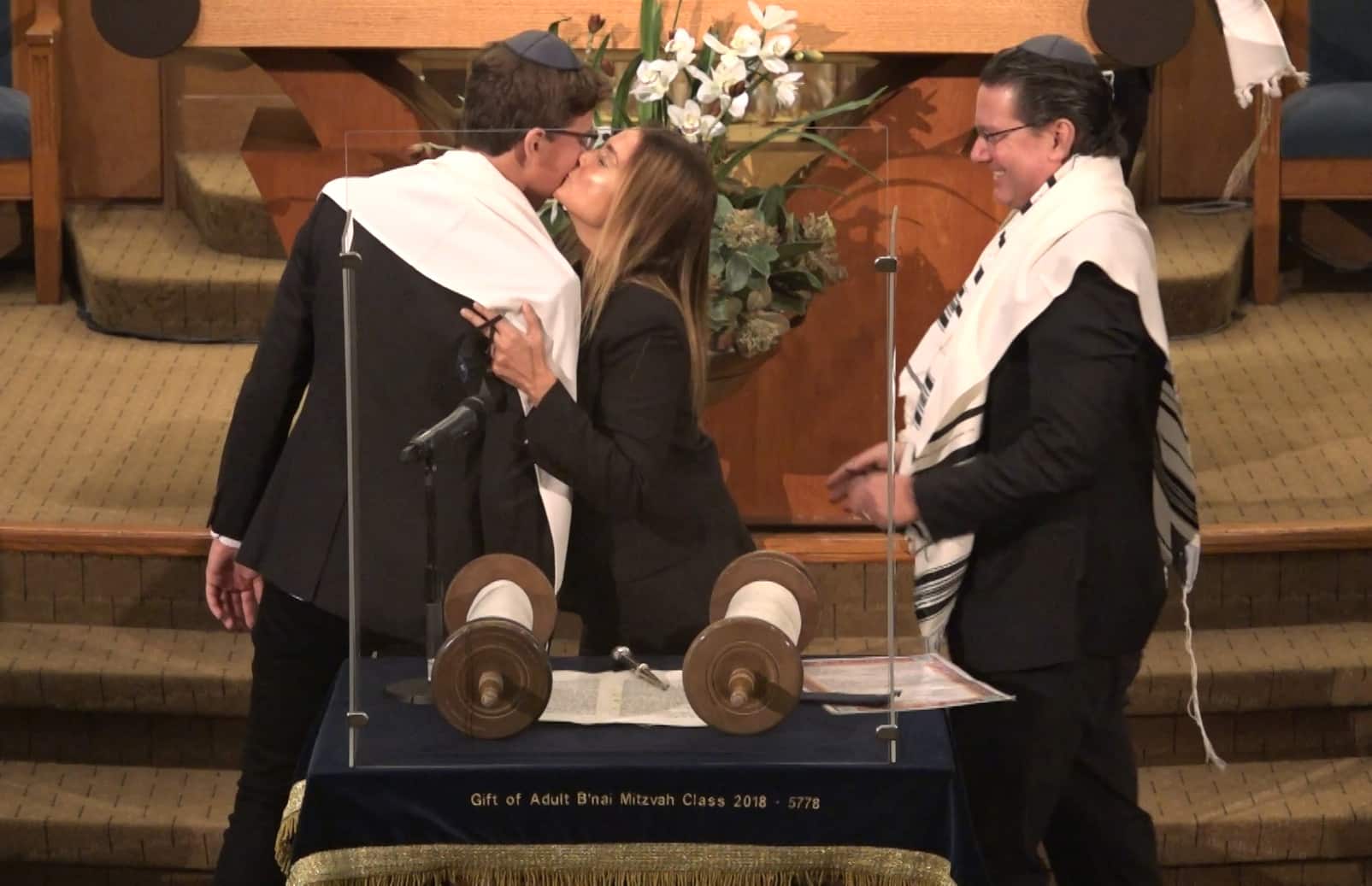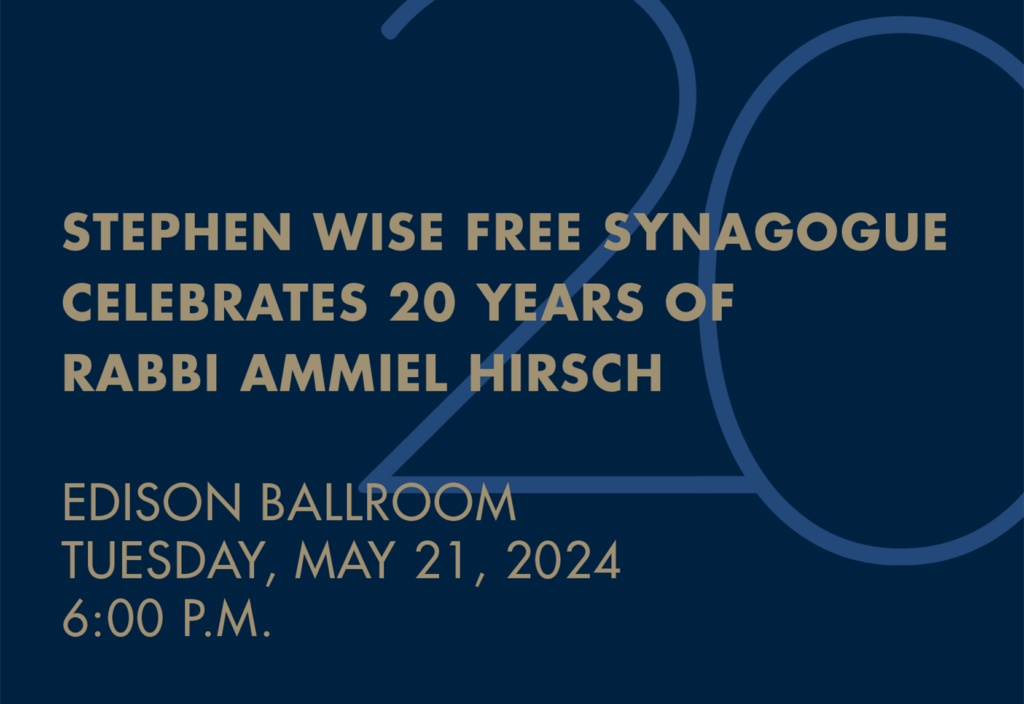Dear Congregants:
We are grateful and relieved that all of the hostages at Congregation Beth Israel in Colleyville, Texas, were unharmed. We wish to thank the members of local, state and federal law enforcement who helped bring this attack to an end. We pray that the hostages and their families recover fully from the emotional trauma inflicted on them.
We express our gratitude to members of other faith communities who have contacted us with expressions of concern and support. May yet another vile attack on Jews in prayer be a catalyst for increased interfaith dialogue between the Jewish and Muslim communities. May we find common ground and come together in common cause, rejecting those who hate and seek to divide us.
It is a sad reflection of our times that synagogues and other Jewish institutions continue to be targets of antisemitic hate. As you know, Stephen Wise Free Synagogue invests considerable resources in protecting our community. We have been assured by our own security consultants, as well as our partners in local law enforcement, that there are no known threats against the synagogue or the Jewish community in New York in the aftermath of Colleyville.
The Jewish way to respond to intimidation and fear is to recommit ever more strongly to our people and our faith. Find ways to express yourselves Jewishly in the days to come. In this spirit, we urge you to consider attending services in person this Shabbat. Jews have always found strength and been uplifted in the face of adversity by coming together as a community. We observe strict health protocols, including requiring masks and vaccination. If you are reluctant to attend in person because of the pandemic, please join us online.
We pray for the peace of the world, and pledge to do our part in the work of social repair.
Rabbi Ammiel Hirsch
Rabbi Samantha Natov
Rabbi Rena Rifkin
Rabbi Shira Gluck
Cantor Daniel Singer
Sandra Divack Moss, Executive Director
Stephen Wise Free Synagogue mourns the passing on Monday, August 16, 2021, of Rabbi Richard G. Hirsch, father of our Rabbi Ammiel Hirsch; father-in-law of Alison Hirsch; and grandfather of Abigail Hirsch. He was predeceased by his beloved wife Bella Hirsch.
Rabbi Richard Hirsch z”l has been called the architect of Reform Zionism and the worldwide movement for Progressive Judaism. He was founding director of the Religious Action Center of Reform Judaism in Washington, D.C., from 1962 to 1973, and he helped pass the landmark Civil Rights Acts of 1964 and 1965. In 1973, he moved to Israel with his family to become executive director of the World Union for Progressive Judaism.
The Hirsch family memorialized Rabbi Richard Hirsch in a letter Tuesday and outlined plans for a memorial to take place in Israel in the near future
Israeli President Isaac Herzog said in a statement: “Rabbi Hirsch was a genuine Jewish pioneer. He charted his own remarkable course, based not on popularity or prestige but on his unclouded intuition, his broad understanding of shifting realities and his deep connection to the Jewish People and the State of Israel.”
“Rabbi Richard Hirsch was a gentleman of great warmth and brilliant humor, an exemplar of social justice and a magnificent storyteller. He was a friend of my father’s, the late President Chaim Herzog, and a friend of mine. I mourn the loss of this great visionary and beloved Zionist leader.”
“At a time when so many think that human rights and Zionism pull in the opposite direction, here is a leader who proves by his own life that the struggle for Zionism and the struggle for human rights are one and the same,” said former Jewish Agency chairman and activist Natan Sharansky.
“I have a sudden awareness of providing history to my great-grandchildren,” says Doris Brickner, Stephen Wise Free Synagogue’s former rebbetzin, who is celebrating her 100th birthday this July. “At seven and nine, they can already recite all the Shabbat prayers without any help.”
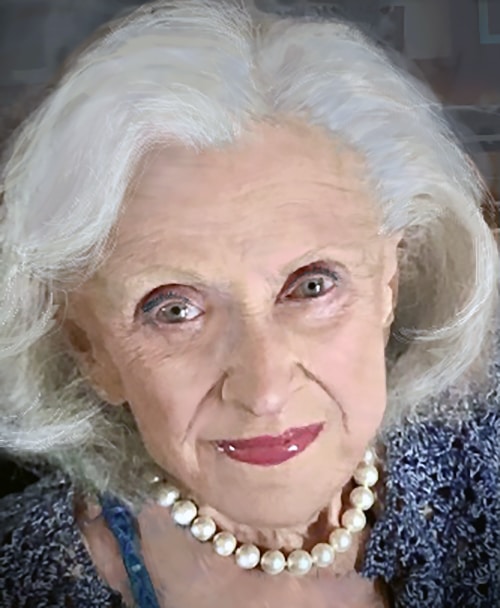
“That’s no accident,” Doris explains. Their father, Cantor Dan Singer, “is an excellent teacher.” Doris is somewhat of an authority on excellent teachers: Jewish study has always been very important to her. “She has a great love for learning and learning for its own sake,” says Rabbi Dr. Martin A. Cohen, a professor of Jewish history at Hebrew Union College-Jewish Institute of Religion and a distinguished member of our synagogue, who’s known Doris for some 60 years. “It was a tremendous privilege to be part of Martin’s graduate classes for many years,” says Doris. “That’s actually how I met Rabbis Sam Natov and Tobias Moss, when they were graduating seniors.”
Rabbi Balfour Brickner’s widow remembers him as “a galvanizing and charismatic force.” She was an important influence on many of the programs and activities he initiated, she recalls fondly: “It was a true partnership. He was courageous about pursuing new ideas — like supporting women in the rabbinate — and we were very much in sync.” Close with our Rabbi Ammiel Hirsch’s parents, Rabbi Richard Hirsch and Bella Hirsch z’’l, Doris and Balfour first met Ammi when he was a teenager. “How fortunate we are that he developed into such an excellent, effective leader for the synagogue and progressive Judaism internationally,” she says. “We all are enriched by the beautiful music and the powerful sermons.”
One of Doris’s true passions is the pursuit of social justice — from the civil rights movement to helping raise millions of dollars for People for the American Way. During the Brickner rabbinate, our synagogue became the first in the city to open an on-site homeless shelter. Still active on our Social Action Committee — along with her daughter Leslie — for more than 30 years, Doris was named Stephen Wise’s Volunteer of the Year in 2013 for her inspiring and impactful leadership.
One hundred years leaves time for a variety of interests. Another of Doris’s passions is the preservation — and discovery — of history. She facilitated the contribution of 1 million documents to the HUC archives in Cincinnati and arranged for the World Jewish Congress to be a major funder for the first excavation of the Jewish catacombs outside of Rome, where she participated on the dig. She also recruited the project’s lead archeologist, Duke University Prof. Eric M. Meyers, who — according to the front page of The New York Times on July 26, 1981 — called the find “exceedingly important.”
Among her numerous personal and professional achievements, Doris is especially proud of her family — her daughters Leslie and Beth, her grandchildren Jason and Lauren (our Cantor Singer’s wife), and her great-grandchildren Aiden and Ariel — and its four generations of involvement at Stephen Wise. “I often wonder how much of me my great-grandchildren will remember,” she reflects as her centennial approaches. “Recently, I let them hold an ancient statue from my archaeology collection, which gave them a sense of awe and Jewish history. I’m trying to create memories for their future.”
Dear Congregants:
I am deeply pained by — and mourn — the loss of life already inflicted and I lament the many further tragedies that will befall both Israelis and Palestinians in the days ahead. Our Sages teach: “Whoever destroys life, it is as if he destroyed the world; whoever saves life, it is as if he saved the world.”
Our synagogue stands with Israel in its fight to protect its citizens and suppress terrorism.
Hamas is an anti-Semitic terrorist organization dedicated to the destruction of Israel. Islamic Jihad is Iran’s subsidiary in the Gaza Strip. While the causes of this latest round of bloodletting are complicated (as is everything in the Middle East) — and do not lend themselves to soundbites — there is no justification for the purposeful targeting of civilians. Every rocket fired from Gaza constitutes a war crime. No country would — or should — tolerate indiscriminate attacks on its civilians.
Our tradition teaches, “All Jews are responsible one for the other.” Of all of the many Jewish values I have endeavored to convey in the 17 years we have been together, this is at the heart: When one Jew is attacked, all are attacked. When one Jew feels pain, all are pained.
We pray for a speedy end to the current bloodletting. We pledge to continue our work towards coexistence and a peaceful solution to the Israel-Palestinian conflict.
Sha’alu shlom Yerushalayim — Pray for the peace of Jerusalem. May those who love you be secure.
Rabbi Ammiel Hirsch
“The hardest part was hearing how disappointed our kids were,” says Director of Youth Education Rabbi Rena Rifkin, who had to call 14 Religious School families in March to coordinate new b’nai mitzvah plans. “Our students spent a full year in tutoring and were getting so excited — but just as they were setting up for a field goal, the goal post moved back.”
Justin Fradkin had planned to celebrate his bar mitzvah at the Kotel, but his family had to cancel their mid-March trip when Israel locked down. A few days later, New York shutdown, too. “We decided that a hurried, virtual bar mitzvah was not what we wanted and so we postponed until we could do it in person,” says Justin’s father, Uzi.
Rabbi Rifkin worked with Justin and the other families to reschedule their dates — and keep them engaged in the interim. “I had a Zoom session every couple of weeks with Whitney or Rabbi Rifkin — and, as I got closer, I met with Cantor Singer and Rabbi Hirsch — to help me stay focused and keep everything I’d learned fresh,” says Justin.
Meanwhile, the Religious School staff had to keep up with all the other b’nai mitzvah students who were already on the roster. “We were most concerned that everything could get cancelled at the last minute,” says Pam Unger, whose daughter Hayden was excited “to finally become a real part of the Jewish community” and didn’t want to mess up when her big day finally arrived this fall.
“We’ve had to rethink everything we do and why we do it — and we’ve come up with some creative new ways of teaching that will impact how our Religious School students learn going forward,” says Rabbi Rifkin. “Our families, too, have had to reimagine what this lifecycle event means for them and focus on the essential experience. While it’s been tough, these have been some of the most joyous and spiritual events I’ve ever been to.”
When Justin was finally able to celebrate on November 7, it was a truly meaningful moment for him and his family. “In many ways it brought us even closer to the Stephen Wise community and it highlighted what’s important about the occasion,” says Uzi. “Our family and friends who attended virtually said they felt as though they’d been there because of the intimacy of the service and the warmth it radiated.”
“It was a really special experience for me,” says Hayden, who became bat mitzvah on November 28. “When we first started planning Hayden’s bat mitzvah over a year ago, this is not what we had in mind,” says Pam. “It ended up being a great experience. All the restrictions actually forced us to bring everything back to the intention of the day: the service. And we probably had more people tune in than would’ve been able to come in person!”
Whether you joined us in-person or online these past High Holy Days, we’re sure you noticed that our services were a little bit different this year — in quite a few ways!
What you might not know is how much effort went in to creating a hybrid worship experience that was familiar yet allowed our congregants to participate no matter where they were. Here’s a look behind the scenes…
Retrofitting the Sanctuary
To protect everyone in the sanctuary, our synagogue engaged a team of health and hygiene experts who helped us create very extensive safety protocols ahead of our reopening. As part of this effort, we improved air flow and circulation and fitted our podiums and choir member stations with plexiglass surrounds and plastic sheeting.
“We made all kinds of creative changes to make the worship experience as happy as possible, as uplifting as possible and as safe as possible,” says Rabbi Ammiel Hirsch.
“Around our virtual table we had a team advising us on industrial hygiene, security, our building’s architecture and engineering, medical issues, ventilation and airflow, government relations and legal matters,” says Executive Director Sandy Divack Moss. “Without spending countless hours consulting with these people, we never would have been able to open as safely and smoothly as we did. And not a week goes by without our continuing to seek their advice.”
And we’re sure you noticed the two 10-foot screens flanking the ark and which allowed us to bring in congregants and musical talent who otherwise wouldn’t have been able to participate.
Behind The Curtain
We needed people who were familiar with our service to operate the two laser projectors mounted on our balcony. So our communications director, Ryan Greiss, and communications associate, Steven Morris, who had both worked closely with Rabbi Samantha Natov and our honors committee to produce all the videos you saw, learned to use the equipment in only a few days.
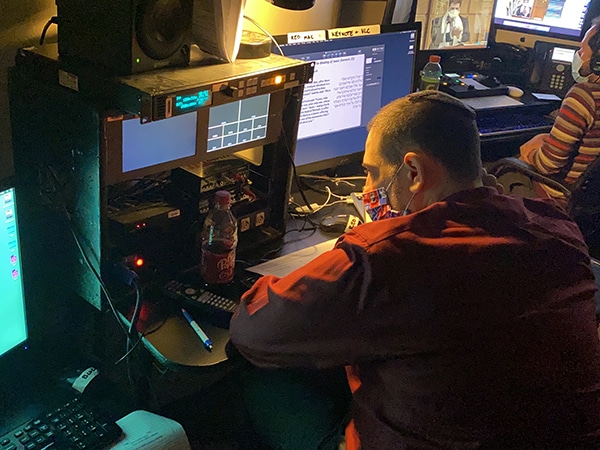
“It’s always been my job to play the Bergen Belsen recording at exactly the right moment in the Yom Kippur afternoon service — and that was always a little nerve-wracking,” says Ryan. “This time, I had to worry about playing everything at the right time!”
Controlling our three high-definition cameras — and live streaming the services to the world — was our longtime videographer and technician, Edgar De La Vega.
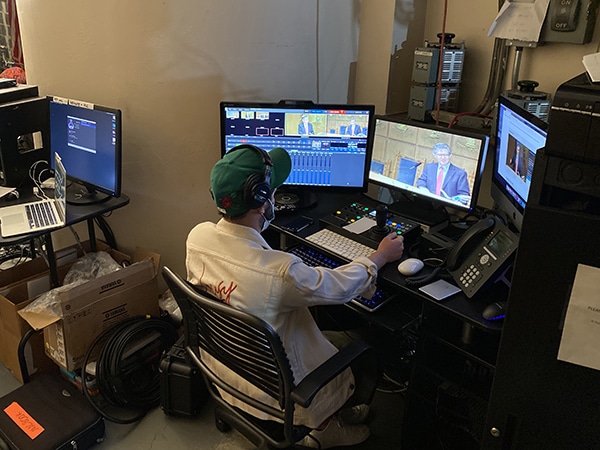
“Usually we prepare to work for a few long days on Rosh Hashanah and Yom Kippur,” says Edgar, who’s been behind the camera at Stephen Wise’s Shabbat and holiday services and b’nai mitzvah for more than four years now. “But this year we had to work around the clock every day for about a month before the High Holy Days — while also making sure Shabbat services and b’nai mitzvah went off without a hitch.”
I Want To Be A Producer
Without our members, there would have been nothing to play on our 10-foot screens! Led by Rabbi Natov and organized by our honors committee, congregants met with Rabbi Natov, Rabbi Shira Gluck, Cantor Dan Singer and our communications staff over the course of two weeks to record each of the honors.
“It was important to us that we found a way for congregants to participate in honors over the High Holy Days even though we couldn’t be together on the bimah,” says Rabbi Natov. “SThe clergy, together with our ritual committee and communications staff, worked tirelessly, reaching out to and recording our congregants in advance of services.”
“Ensuring that all of our more than 100 honorees were recorded and that their footage was then edited together to make 35 final videos — some with multiple versions — meant that we needed to keep a lot of information organized,” says Steven.
“Participation from the congregation has always been a fundamental part of our identity and our services. We wanted these High Holy Days to feel as close to ‘normal’ as possible — and to allow for those who were in our sanctuary and those who chose to stay home to have the same meaningful experience,” says Cantor Singer. “Following strict protocols regarding singing and wind instruments to keep everyone safe, we prerecorded all of the High Holy Days music with our band and a quartet of masked singers over the course of a very long day. We used that music for services and for the backing tracks accompanying our very talented congregational soloists, so that everyone could participate and it looked and sounded as if everyone was in the sanctuary, singing and playing together.”
“Being able to see our members together on screen throughout worship on Rosh Hashanah and Yom Kippur made all the difference in helping us feel connected to each other,” adds Rabbi Natov.
After production wrapped, Ryan and Steven closely reviewed the hours of footage before delivering it to Edgar — with meticulous notes — so he could edit the 35 final videos that played during this year’s High Holy Days services.
“After Ryan and Steven sent me the footage and their notes, I would organize and edit each video — which often took several hours and several emails back and forth to get exactly right,” says Edgar. “I had to mix and match footage from different recording sessions and loop some videos and cut others to make sure prayers were synchronized and that video shot separately would work together and look as natural as possible. Then I added name titles and labeled each video so we would know when in the services they should play.”
An Online Rabbi
“We had an amazing turnout for tot and family services,” says Rabbi Gluck, who led the virtual services for young families with Rabbi Rena Rifkin — and is running virtual Family Experiences until we can gather in person again. “Before the holidays, we provided Tot Shabbat kits with all sorts of objects to help families learn and interact virtually. During Tot Shabbat I like to invite our kids to cuddle their plush Torah scrolls while I teach about Torah. It’s absolutely adorable.”
And since so many of our congregants had to join the main services remotely this year, Rabbi Gluck was there with our viewers on Facebook and YouTube, making sure everyone could keep up with the electronic prayer books she’d prepared and offering ways to connect with the services and with each other.
“People were so happy that they were able to feel like they were in the sanctuary from afar, and they loved seeing their friends from the congregation up on the screens,” she says. “We got so many messages of appreciation from people who were homebound — and not just because of COVID — thanking us for giving them the opportunity to worship during the holy days, and for having a rabbi with them online to guide them through the services.”
A Herculean Effort
We knew it would take a lot of time and resources to produce a meaningful High Holy Days experience for everyone who would be joining us online and in person.
“We spent a lot of time and a lot of money creating something that was safe and that would allow people to come together,” says Stephen Wise President Marc Bernstein. “Someday, we’ll all be back in the synagogue again. But until that day comes, please, please continue to support our synagogue as generously as you possibly can. Our synagogue rests upon the shoulders of the generations before us and the future of our synagogue depends on us.”
It is with deep appreciation that we thank those who contributed to Stephen Wise’s Yom Kippur Appeal. If you haven’t already made a gift, it’s not too late to support our efforts to strengthen Judaism in our local community and beyond. Your contribution, no matter the size, is vital to our community!

